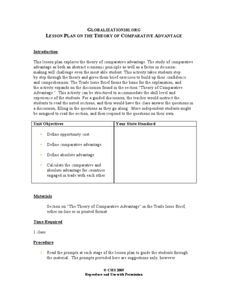Curated OER
In Your Own Words...
Learners discuss the importance of comprehension and the use of summarization. Through guided practice, they summarize given paragraphs. Independently, they read an article and highlight information that they believe is very important....
Curated OER
My Region Through Time
Students identify the region of state in which they live on a regional map. They read information about the time period assigned and identify significant historical events that occurred in the region.
Curated OER
Sum It All Up
Students observe and demonstrate the process of summarizing text. They discuss the importance of summarizing, then listen to the teacher read a chapter from the book "Sarah Plain and Tall." Students observe the teacher write a summary...
Curated OER
The Giver
Students read and analyze the novel, 'The Giver.' They classify activities in an activity regarding freedom of choice, create a list of rules, conduct a debate, write a skit, and write an essay on genetic engineering or utopian societies.
Curated OER
Smart Board Literacy Center
Learners practice spelling their names. In this technology and early emergent literacy lesson, students locate the letters in their name among a cluster of letters on the Smart board, then click and drag each letter to the other side of...
Curated OER
First and Last Sentences
Third graders discover how to read sentences in a paragraph and know the main idea. In this main idea lesson, 3rd graders read paragraphs, underline the first and last sentences and determine the main idea. Students do guided and...
Curated OER
Treaties
Students explore Canadian maps. In this map skills and Canadian history instructional activity, students locate reserves that originated from treaties made while establishing the Saskatchewan First Nation reserve communities. Students...
Curated OER
Tell Me All About It!!
Students discuss the importance of comprehension and the use of summarization. Through guided practice, they follow five steps in finding and highlighting important information, while deleting information that is not needed. Using the...
Curated OER
Fairytale Cake
Students recreate characters from the story, "The Fairytale Cake." In this fairy tale characterization lesson, students first listen to fairy tales read aloud. They then use play dough and plastic bowls as pretend "cakes and icing", and...
Curated OER
What's Important?
Students, through teacher modeling and guided practice, explore four steps/rules of summarizing. In groups, they read a short passage and then, by applying the summarization rules and skills, write an effective summary of it.
Curated OER
Wanted: Only the Facts!
Learners apply three steps to summarizing successfully (delete trivial and redundant material, replace superordinate terms with a list or action term, and invent a topic sentence.) Through guided practice, they follow these rules in...
Curated OER
Turn, Turn, Turn
Young scholars discover how to select a book and determine if it is too difficult to read. They break into groups of two; with one partner spinning the other around several times with their eyes closed and then the other person guides...
Curated OER
Assembling an Aircraft
Learners practice reading directions from a task card to assemble a paper aircraft during their Moon, Mars and Beyond mission. They relate the activity to their mission work and recognize the importance of reading directions.
Curated OER
Staying Healthy Year Round
Students are read a variety of books and observe the weather in the different seasons. In groups, they compare and contrast the type of activities people are doing. They also discuss how they adapt to the changes in seasons by the...
Curated OER
Comparing Chores - Past and Present
Students read "Sarah Norton's Day" and explore the responsibilities of colonial day children. As a group, students list the responsibilities they have at home. Using a Venn Diagram, they compare and contrast their chores and...
Curated OER
Communication
Elicit from the Ss things that people say that bother them when they are having a conversation. For example: When I'm sharing my problem and the other person says, "Well, you know what happened to me?" Ask what is wrong with this...
Curated OER
The Debate in the United States over the League of Nations: Disagreement Over the League
Students read the words and listen to the voices of some central participants in the debate over the League of Nations.
Curated OER
Lesson Plan on the Theory of Comparative Advantage
Twelfth graders practice using new vocabulary related to economics. They discover how to calculate comparative and absolute advantage. They also read different articles about the topic.
Curated OER
Living Organisms
First graders investigate living things that are part of a class aquarium. They make observations and answer guided questions about each organism. Students read a Science textbook and engage in a class discussion about the content. Then...
Curated OER
Great Expectations By Charles Dickens: A Classic, Or Just a Novel?
Seventh graders read the novel Great Expectations by Charles Dickens. They consult Media Center and online sources as they conduct research needed to write an essay that answers the question, "Is Great Expectations a classic, or just a...
Curated OER
Government law
Fifth graders explain how a bill becomes a law. They watch a video and take notes on the video titled: America Rock "I'm Just a Bill." Students work in groups to create a bill to present to congress that relates to safety. They read...
Curated OER
Introduction to Song and Dance
Pupils listen to music and learn different dances. After reading the story, "The Music for Max", students can draw their favorite instruments from the book.
Curated OER
Describing Words
First graders brainstorm adjectives, recognize adjectives within text read by teacher, identify sentences that contain adjectives using Hyperstudio stack, and write two descriptive sentences for abstract image they create.
Curated OER
I Hear an "A"
Young scholars explore the long "a" sound. Using the Michigan quarter reverse design, students say the words aloud to discover the long "a" sound. Young scholars read given words and identify the long "a."

























